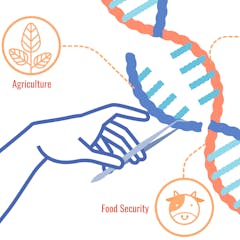
Articles on Mosquitoes
Displaying 81 - 100 of 195 articles

Ticks are generally inactive in the winter and start to look for their next meal as temperatures warm up. But as winters warm, every season may become tick season.

CC BY-NC-ND6.58 MB (download)
It's increasingly difficult to manage diseases in inner cities.

Murray Valley encephalitis virus is a rare but potentially fatal mosquito-borne virus. Here’s what you need to know about it.

The more water, the more mosquito eggs are laid, and the more mosquitoes end up buzzing about. But to spread disease to people, they first need to bite infected wildlife.

CC BY-ND5.68 MB (download)
Drones are being used to combat malaria in Zanzibar.

Thousands of Australians contract Ross River virus each year. Mozzies can infect us with their bites, but only after they’ve bitten an infected animal host.

You may not agree with using the gene-editing tool, CRISPR, to alter the DNA of human babies. But what about using it to engineer plants? Or wipe out one of the world’s most dangerous creatures?

Researchers are exploring genetic forms of population control called gene drives that spread traits faster that happens naturally. The goal is to curb mosquito-borne diseases like malaria.

Only half of Australia’s mozzies have been officially diagnosed, so how are scientists able to identify the others to help fight disease?

Genetically modified mosquitoes breed fear and suspicion, especially since the research happens behind closed doors, away from the public. Now scientists and architects are trying to change that model.

It’s tempting to ditch the mozzie creams and sprays, and switch to clothing that has its own “built in” bug repellent instead. But the technology isn’t quite there yet.

The fight against malaria needs scientific innovation. But community buy-in is just as important.

Researchers have tried unsuccessfully for decades to develop a malaria vaccine. Now a new approach, showing promise in mice, suggests it is possible to block mosquitoes from spreading the disease.

Japanese encephalitis virus is rare and doesn’t usually cause symptoms. But in a small proportion of cases it can result in long-term neurological impairment and death.

South Africa is piloting a new technique as it drives to eliminate malaria.

The forecast arrival of El Niño may mean the east coast of Australia will experience an exceptionally hot and dry summer, but does this mean there will be fewer mosquitoes buzzing about?

Is our changing climate making regions of the US more suitable for ticks and mosquitoes that spread diseases? Or is the climate changing human physiology making us more vulnerable?

Yes, giant mosquitoes are a thing. They’re specialized to wait out the dry times only to emerge from their eggs when high water provides the perfect larval environment.

Mosquitoes are transferring microplastics eaten in water into birds and other non-marine animals.

Bug sprays with DEET feel oily and smell gross. That’s why scientists are developing new mosquito repellents based on natural plant oils. But translating these into commercial products isn’t easy.





